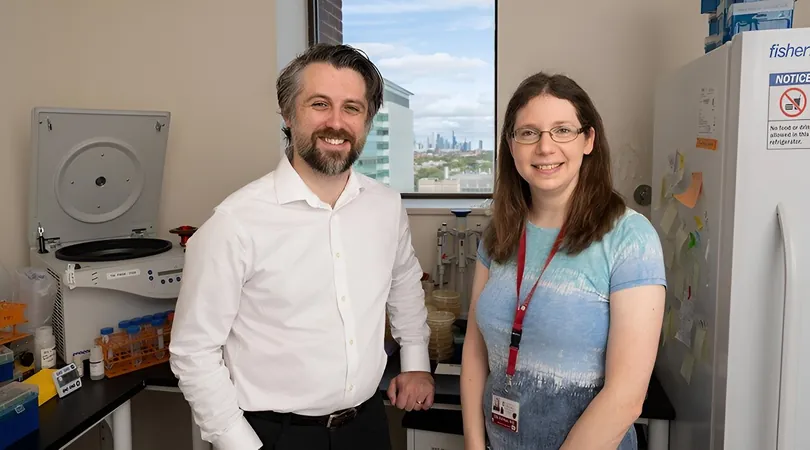
Revolutionary Phage Cocktail Offers Hope in the Fight Against Drug-Resistant Bacteria!
2024-10-04
Author: Rajesh
Introduction
Researchers have unveiled a groundbreaking strategy in the relentless battle against drug-resistant bacterial infections—introducing bacteriophages, natural viruses that specifically target bacteria. A recent study conducted by scientists at the University of Chicago's Pritzker School of Molecular Engineering (PME) and UChicago Medicine has demonstrated that a specially crafted phage cocktail can effectively combat antibiotic-resistant Klebsiella pneumoniae infections in mice.
Complexities of Phage-Bacteria Interactions
Yet, amid this promising development, the complexities of phage-bacteria interactions have come to light. It turns out that the phages deemed most effective in laboratory settings didn't always produce the same results in living organisms. Both phages and bacteria possess the ability to evolve; in certain scenarios, phages adapt to become better at eliminating bacteria, while in others, the bacteria evolve mechanisms to resist phage attacks.
"We still believe phages hold incredible potential for treating stubborn bacteria like Klebsiella," explained Mark Mimee, assistant professor of molecular engineering and senior author of the study published in Cell Host & Microbe. "However, phages act like a living, constantly changing antibiotic, which adds a layer of complexity to their application."
Understanding Klebsiella pneumoniae
Klebsiella pneumoniae bacteria are typically harmless residents of the human intestine. However, they become dangerous when they invade areas like open wounds, the lungs, the bloodstream, or the urinary tract—often spreading within healthcare settings. The emergence of drug-resistant strains has made treating these infections increasingly difficult.
Patients suffering from recurrent urinary tract infections caused by Klebsiella are frequent visitors to health clinics. Dr. Sandra Valaitis, a urogynecologist at UChicago Medicine, shared, "Many of these strains develop resistance to oral antibiotics, which drastically narrows treatment options. We desperately need innovative solutions."
Phage Screening and Identification
Phages have been recognized for over a century as nature's weapon against bacteria, yet their application in medical settings has been limited due to their specificity to particular bacterial strains, complicating the identification of suitable phage candidates for treatment.
In the new research, scientist Ella Rotman took a bold step by screening wastewater to identify phages capable of targeting 27 distinct strains of Klebsiella, including 14 that were freshly isolated from patients at the University of Chicago. This screening led to the identification of several dozen phages with the potential to destroy at least some strains of Klebsiella. The researchers then conducted an analysis to determine the genetic traits that made these bacteria vulnerable to various phages.
Creating the Phage Cocktail
Using this information, Rotman and colleagues formulated a specialized mixture of five phages, each engineered to attack different bacterial components. In laboratory settings and in mouse models, this phage cocktail not only increased the likelihood of Klebsiella being targeted by the immune system but also made some strains more susceptible to traditional antibiotics. However, there were perplexing instances where bacteria developed increased resistance post-treatment.
"It's one of those situations where biology often leads us down unpredictable paths," Mimee noted. "But it also presents a unique opportunity to further explore the intricate dynamics between phages and bacteria."
Co-evolution of Phages and Bacteria
To advance this research, the team deliberately allowed the phage mixture to co-evolve alongside isolated strains of Klebsiella. Remarkably, this evolutionary process enhanced the cocktail's efficacy in neutralizing Klebsiella. In their observations within the mouse intestines, the researchers noted a fascinating co-evolution: while Klebsiella developed defenses against the phages, the phages simultaneously adapted to better infect the modified bacteria.
Future Research and Clinical Trials
Mimee’s laboratory group is currently expanding their experiments to gain deeper insights into how various phage-bacteria combinations interact and the impact of naturally occurring bacteria present in the human body. Concurrently, they are collaborating with Dr. Valaitis to seek FDA approval for a small-scale clinical trial aimed at testing this innovative phage mixture for patients grappling with urinary tract infections.
Conclusion
The research highlights a potential game changer in the fight against drug-resistant bacteria, sparking hope for effective treatments in the future. Will this phage cocktail be the breakthrough we've all been waiting for? Stay tuned!


 Brasil (PT)
Brasil (PT)
 Canada (EN)
Canada (EN)
 Chile (ES)
Chile (ES)
 España (ES)
España (ES)
 France (FR)
France (FR)
 Hong Kong (EN)
Hong Kong (EN)
 Italia (IT)
Italia (IT)
 日本 (JA)
日本 (JA)
 Magyarország (HU)
Magyarország (HU)
 Norge (NO)
Norge (NO)
 Polska (PL)
Polska (PL)
 Schweiz (DE)
Schweiz (DE)
 Singapore (EN)
Singapore (EN)
 Sverige (SV)
Sverige (SV)
 Suomi (FI)
Suomi (FI)
 Türkiye (TR)
Türkiye (TR)